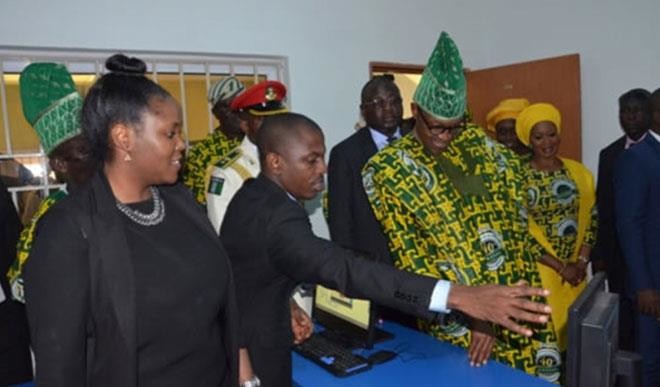Samsung Smart School compliments prior education-related ICT initiatives in Nigeria
President Muhammadu Buhari and the governor of Ogun State, Ibikunle Amosun, commissioned the second Samsung Smart School for Teachers in Abeokuta barely two weeks ago. The school is located within the recently commissioned Ogun State Model College. The event was basically an item in the agenda for the activities that marked the 40th anniversary of […]


President Muhammadu Buhari and the governor of Ogun State, Ibikunle Amosun, commissioned the second Samsung Smart School for Teachers in Abeokuta barely two weeks ago. The school is located within the recently commissioned Ogun State Model College. The event was basically an item in the agenda for the activities that marked the 40th anniversary of the creation of Ogun State.
When I read about the Samsung Smart School event in the papers I was instantly reminded of two other events: prior strides that had been taken in local ICT content development in Nigeria, and the apparent willingness of Koreans to share their country’s miracles with developing nations.
On the first point, I wrote in the July 29, 2013 issue of this column, about Ọpọn Imọ, IPPIS, e-government, and other software initiatives that had propped up in Nigeria. In fact, these tools were the subject of a keynote speech delivered by the then Nigerian Minister of Communication Technology, Mrs. Omobola Johnson, at the 11th International Conference of the Nigerian Computer Society (NCS). The conference took place on July 24 to 26 2013 at Royal Park Hotel in Iloko-Ijesa, Osun State, Nigeria.
Mrs. Johnson articulated her ministry’s roadmap to ICT advancement in Nigeria, starting with a discussion of Nigeria’s below-average global rankings in key ICT metrics, followed by her summary of the four components of her agenda (Direct Nigeria, Connect Nigeria, Local Content, and ICT in Governance). However, the topics that seemed to have captured the attention of the audience during the minister’s session at NCS 2013 are Ọpọn Imọ and IPPIS.
ỌPn Imọ is a Yoruba phrase: “Ọpọn” is tablet, or slate, like the one primary school pupils write on with a chalk. “Imọ” is knowledge. So Ọpọn Imọ literally translates to “tablet of knowledge.” Functionally speaking, it is an electronic tablet device inside which has been pre-loaded learning materials for secondary school (SS) students in Osun State, Nigeria. A presentation of Ọpọn Imọ was made at NCS 2013 by the Osun State government.
ỌPọn Imọ is a learning environment designed specifically for SS1 through SS3. There are three basic components: e-Library, Virtual Learning, and Integrated Test Zone (ITZ). The e-Library environment contains the textbooks for all the 17 subjects in Arts, Science, and Social Science. Virtual Learning contains the teachers’ tutorials and lesson notes. The ITZ contains past questions in MOCK and the West African Examination Council (WAEC) exams, and allows students to take practice tests. (WAEC refers to an exam that is jointly administered by West African countries for the purpose of providing a common platform for evaluating all secondary school graduates in West Africa.) The Ọpọn Imọ programme is a vital component of the overall Osun State initiative, which has been dubbed “OTELS,” for Osun State Technology-Enhanced Learning Systems. The Ọpọn Imọ device is free to all students!
IPPIS stands for “Integrated Personnel and Payroll Information System.” It was conceived by the Federal Government of Nigeria (FGN) “to improve the effectiveness and efficiency in the storage of personnel records and administration of monthly payroll in such a way as to enhance confidence in staff emolument costs and budgeting.” The precise objectives of IPPIS include facilitation of manpower planning and assistance in providing information for decision making. The system also helps to monitor monthly payment of staff emoluments; it aids budgeting by providing accurate recurrent expenditure data, and it eliminates payroll fraud. The IPPIS project has been divided into phases, with Phase I commissioned in 2006, using just six pilot ministries, departments, and agencies (MDAs). IPPIS was initially financed as a pilot project by the World Bank. As of July of 2013, IPPIS supported 219 MDAs, with 321 to go. Also, the Nigerian government had reported on the elimination of up to 46,000 “ghost workers” and a savings of over three-quarters of a billion United States dollars as of July 2013. I am pretty sure these statistics would have gone up by now.
Like Ọpọn Imọ, the Samsung Smart School idea has an end goal of improving the educational system at the secondary level, though with slightly different modus operandi. Among other features of the Smart School project, teachers will be trained on accessing digital contents, sharing contents with students, monitoring students’ progress and conducting assessments (tests and exams). Samsung has a plan to launch a total of 5 smart schools in Nigeria, with two of these already launched.
South Korea seems to be living up to the unwritten charge given to it by the United Nations, which is to be a model, to share its tech miracles with developing countries. You see, within a period of approximately 50 years, South Korea, a country with very limited natural resources, evolved from being one of the poorest in the world to one of the most advanced today. Korea comfortably leads the world in ICT.
